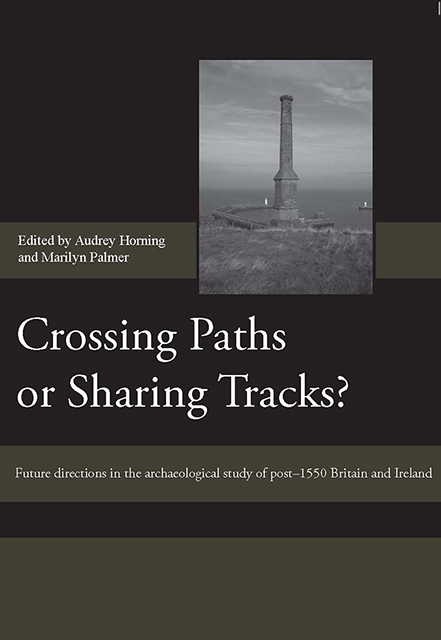 Crossing Paths or Sharing Tracks?
Crossing Paths or Sharing Tracks? Published online by Cambridge University Press: 07 March 2023
This chapter continues the ongoing exploration of scale as it pertains to the practice of historical archaeology. Ideas from non-archaeologists are used to present a way to create dialectical multiscalar analyses of archaeological sites from the second millennium CE. An example from early 19th-century rural Ireland illustrates the way such an interpretive framework may be framed.
INTRODUCTION
Questions about archaeological scale have been inherent in the discipline for many years. Archaeologists began to think about issues of scale as soon as they began to look beyond the boundaries of their sites and into the world beyond. As a result, considerations of scale will always be pertinent in archaeological thinking. Historical archaeologists, particularly those investigating the second millennium CE, may be especially interested in issues of scale because of the rise of a true worldwide globalisation during the period of their expertise. For these archaeologists, the linkage between ‘the local’ (the site) and ‘the global’ (the world outside the site) is a subject of profound interest.
The purpose of this chapter is to explore issues of scale in the archaeology of the most recent centuries, or what I have elsewhere termed ‘global historical archaeology’ and ‘modern-world archaeology’. I believe that archaeologists will only be able to address important topics like globalisation after they have created useful models that will help them to link individual, sociohistorically unique sites withother sites and regions. In post- Columbian history, the connections are trans- and multinational as well as multicultural. This discussion off ers one way for archaeologists to begin fashioning multiscalar analyses that hopefully will contribute to understanding further the broad historical processes that aff ect our daily lives.
ISSUES OF SCALE
In their recently edited collection entitled Historical Archaeology, Martin Hall and Stephen Silliman list the six themes they perceive as centrally important to today's historical archaeology. Presenting scale first, they succinctly state the central question of concern: ‘How does a historical archaeology of the modern world hold in the same frame attention to the “small things forgotten” of everyday life and particular individuals and the global system of distribution characteristic of modernity?’
To save this book to your Kindle, first ensure [email protected] is added to your Approved Personal Document E-mail List under your Personal Document Settings on the Manage Your Content and Devices page of your Amazon account. Then enter the ‘name’ part of your Kindle email address below. Find out more about saving to your Kindle.
Note you can select to save to either the @free.kindle.com or @kindle.com variations. ‘@free.kindle.com’ emails are free but can only be saved to your device when it is connected to wi-fi. ‘@kindle.com’ emails can be delivered even when you are not connected to wi-fi, but note that service fees apply.
Find out more about the Kindle Personal Document Service.
To save content items to your account, please confirm that you agree to abide by our usage policies. If this is the first time you use this feature, you will be asked to authorise Cambridge Core to connect with your account. Find out more about saving content to Dropbox.
To save content items to your account, please confirm that you agree to abide by our usage policies. If this is the first time you use this feature, you will be asked to authorise Cambridge Core to connect with your account. Find out more about saving content to Google Drive.